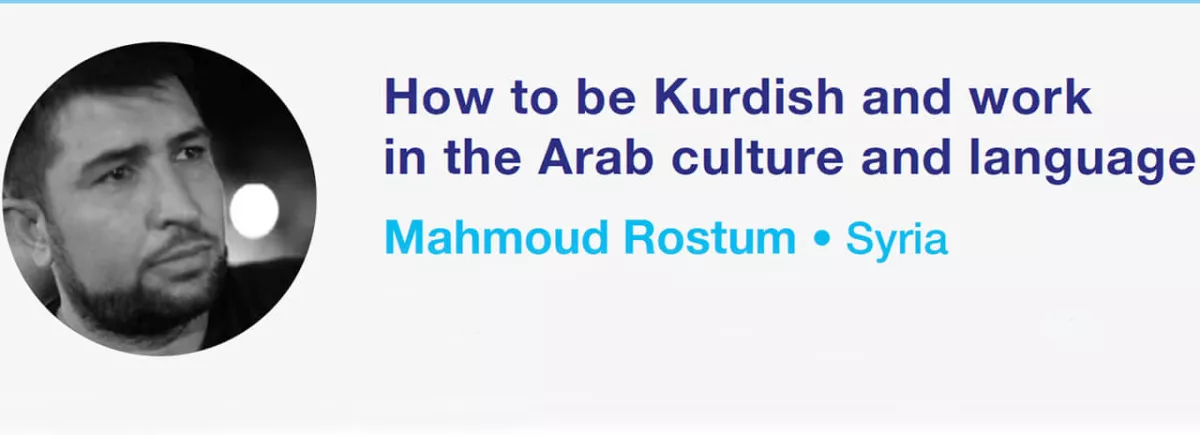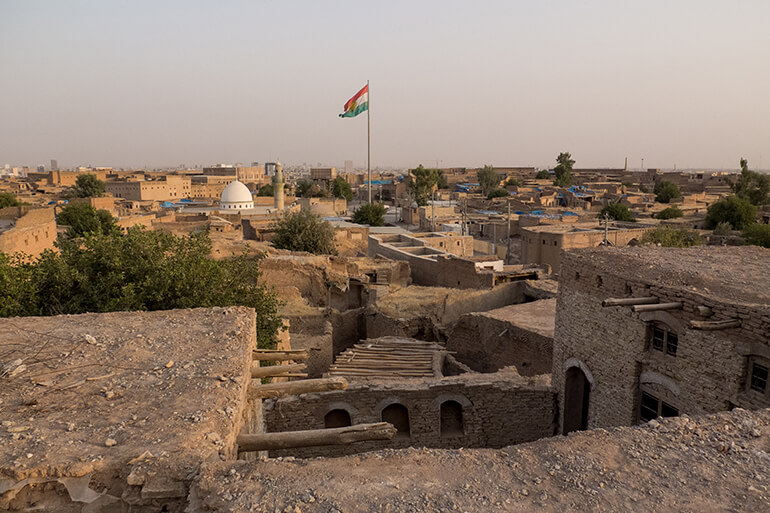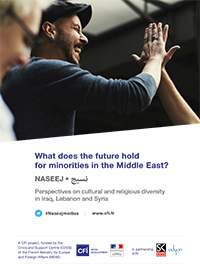
How to be Kurdish and work in the Arab culture and language
Related project
NaseejDiscover a selection of the best articles dealing with cultural and religious diversity in the Middle East, entered in the Naseej competition launched by CFI and SKeyes in October 2017.
This week, the iraqi journalist Mahmoud Rostum talks about the two languages he knows, Kurdish and Arabic, and in what context he uses each.
Published in Al Joumhuriya on 1st August, 2017
Now that I'm in my forties, I realise I possess nothing other than writing in the Arabic language. Writing is the only trade I have mastered reasonably well. Basically, I know how much I failed in all the other occupations I embarked upon, like so many other Syrians too, when I was a student and looking for the means to support myself.
Besides the writing profession, reading is my favourite and perhaps only leisure activity. For me, reading is a source of relaxation. It also constitutes my route towards an awareness of my existence and its meaning. I spend most of my time reading and if I happen to be busy for once, I am engulfed by a strange feeling of guilt, similar to that of a believer who deviates from their religious duties.
I read and write solely in Arabic. In fact, I have mastered professional reading and writing only in this language, even though it is quite different from my mother tongue, which is Kurdish. It should be noted that most of my circle, including my parents, cannot read or write in Arabic. I myself, only use Arabic in everyday life on very rare occasions.
Moreover, the Arabic works of literature that I have read over the years were not connected with the world in which I spent my childhood and youth. The Arabic language and culture, its concerns and products were completely separate from the social and human world in which I lived and still live today.
In addition to this fundamental contradiction, the Arabic language has never been the language for my underlying emotions, in which I can express the simplest as well as most complex of feelings. In the Arabic language, I have mastered the cognitive processes and a high degree of expression but not the expressions from everyday life in all its detail: the codes and conventions, proverbs, jokes, comparisons, changes in tone, connotations and views in conversation. I do all these quite naturally in the Kurdish language.
A profound schizophrenia
After years of daily reading and writing in Arabic, and years spent in Arab cities and communities, I remain cautious when speaking this language: I feel within me a mixture of timidity, fear and lack of confidence regarding the accent, pronunciation, real meaning of the words, the correct expression and the delicate nuances of the non-verbal in the spoken word. Often in public meetings, I imagine myself writing rather than speaking.
In short, you might say there exists within me a kind of profound schizophrenia. In fact, it's a case of two languages that share a common awareness of the world and interaction with that world: Arabic is the language of the higher consciousness, of knowledge and of culture, the arts, terminology, texts, laws and literature; whereas Kurdish is the language of everyday life, of feelings, subjectivity, stories, jokes, insults, emotions and songs.
This problem is not strictly personal, but affects millions of Syrian Kurds who have been writing in Arabic for the last few decades. It is magnified still further amongst writers and intellectuals.
In fact, the majority of the Kurdish people have rare and limited contact with the Arabic language and can easily carry on regardless of any connection linking them to that language. For writers, on the other hand, Arabic constitutes the language of their daily work-related thoughts, concerns and interaction.
There can be no analogy drawn between an Arab writer living in a Western country and writing in the language of that country, or even an Arab writer who writes in French, the language of the forces who occupied their country. The two situations are not the same at all, for two complex reasons. The first is that Arabic has always been ''a complete language'', if I may put it like that, for at least two centuries, when it was introduced to linguistic modernity
with printing.
The Arabic language is rich and is structured around three pillars: the sacred religious heritage of the Arab world, reinforced by thousands of instances of legislative, legal, intellectual and dialectic content; the literary heritage, especially from poetry; and lastly the historic and political legacy of the elders of Arab regimes and kingdoms.
In other words, the Arabic linguistic experience is extremely rich and includes journalism, literature, heritage, the sacred, sciences, school and university systems and literary collections.
[…]
The same cannot be said for the Kurdish language. The Kurdish language is extremely impoverished as, historically, it has been crushed between, on the one hand, the matchless sacred and religious Arabic language and, on the other, the languages of the two great Persian and Ottoman empires. The dreadful 20th century refusal and denial of the Kurdish existence (political, cultural and everyday existence) destroyed this language and deprived it of a normal evolution in the modern era, as well as of any possibility of being transformed into a political and cultural language of everyday life, used in the press, media, public institutions and official discourse.
All these reasons have deprived Kurdish writers of the establishment of a smooth return to their native language or even personal interaction with it, even though it would not have been the language in which they wrote, but just a source of inspiration and a companion to their language of knowledge, i.e. Arabic. The Kurd's ''venture'' in Arabic writing was like a one-way street: It was impossible for him to retrace his steps.
The second reason why it is not possible to make the comparison (between a Kurdish writer, writing in Arabic and another Arab, writing in a foreign language), is connected with the nature of the political regimes that have governed two Arab countries, Syria and Iraq, where Kurds and Arabs have contributed to public life. In reality, the regimes of both countries were nationalistic right from their foundation, and, during the Ba'athist phases, propagated the ''absolute Arabism" model, in the words of the writer, Yassine Al-Haj Saleh.
The Ba'athist period was actually the longest in both countries' modern history and also the hardest for their entire population. However, the Ba'athists, the Syrians in particular, saw in the Arabic language an indestructible link with the Arab identity and, consequently, venerated it. In this context, the imposition of the Arabic language in the public domain was deemed a ''supreme activist mission''. This necessarily aroused strange mistrust of other languages, notably the Kurdish language. The Syrian Ba'athists drew their inspiration from the writing and theories of the nationalist thinker, Zaki Al-Arsuzi who strove for the formation of an organised, homogeneous nationalist group at a domestic level and the adoption of Arabic as the sacred national language.

The Arabic language imposed in public space
It is true that no ''fascist'' nationalist practice was directly applied by the Syrian Ba'athists in imposing the Arabic language on Kurdish Syrian citizens or those belonging to other non-Arab ethnic groups, and yet the pace adopted by the Syrian State's institutions from the start of the 1960s led to the same result: the Arabic language was imposed, exclusively, in all institutions of education and knowledge, in the media as well as the public domain and in all teaching programmes, even those relating to the science departments of universities in Syria. Moreover, no school was allowed to open if indigenous languages other than Arabic were regarded as secondary languages.
[…]
Through this process, the Kurdish language had no chance of evolving in the public arena, especially in the world of knowledge, culture and the arts. The most basic aspects of the Kurdish heritage gradually deteriorated until they were extinguished. Music, proverbs, tales, songs, prayers and religious discourse in the Kurdish language virtually disappeared, and what remained was partially or totally Arabicised.
This separation contributed towards distancing Kurds working in the field of knowledge and culture from their own oral and written heritage. This situation is comparable to the symbolic uprooting of the individual or author from their emotional, spiritual and symbolic environment. In other words, the first worlds residing deep down within them: their childhood and first experiences, their way of thinking and everyday interaction with surrounding phenomena, and all cumulative experiences gained in the outside world, beyond the stable, have in some way destroyed each other.
Now, it is this great richness that constitutes the basis for writing, culture and the professions associated with them, as it concerns, quite simply, the essence of the existential experience.
There is another component in the relationship between Kurdish authors and intellectuals, and the Arabic language: they have never and will never succeed in curing themselves of a generalised linguistic and cultural phobia in the face of the Arabic language. In reality, Syrian Kurds lived within a narrow geographical strip of the country but in regions and environments that were disconnected from each other, and Syrian Arabs always constituted the majority at every level (residents, language, State and power).
This geographic and cultural demarcation was an important factor that, for centuries, raised the fear amongst the Kurdish people of ''smooth assimilation" with the Arab linguistic and cultural arena. This fear was also heightened, given the very strong historic links between the Kurdish tribes and Arab tribes and by the fact that Arabs held a special place amongst the conservative Kurdish classes, with Arabic being the language of conscience and of religious practice. Therefore no-one was exempt from this phobia. On the contrary, it increased amongst writers and intellectuals.
[…]
Kurds working in Arabic have always been torn by these aspects. Whatever course they follow, whether they decide to integrate or isolate themselves from the Arabic language, they do not manage to rid themselves of those aspects that are inherent to them and that constitute the major traits in their cognitive personality. If we take an image from popular and traditional Kurdish culture, this relationship would resemble, in every respect, that of a child with their stepmother. The latter tries firmly and suddenly to occupy the place of their mother, whilst remaining the only person who can offer to fulfil their day-to-day needs, it is she who will, in the end, conquer their emotions and memory, because of the impact of their everyday relationship, day after day.
A feeling of guilt
On a cultural level, Kurdish society was expecting the ''intellectuals'' to defend the reality of the symbolic Kurdish presence as well as the Kurdish language, culture, history and products. The direct result of this mission would have been the Kurds' refusal to integrate the others' culture, language and affairs, to plunge instead into their own identity, whilst knowing that their own necessary resources would not have been available to them, unlike in the language and culture of the others, as the only sources available and even imposed.
Kurdish people who have worked in the Arabic language have felt they aroused disappointment in those around them. That is why they have often shown hard, feigned nationalistic tendencies, as a reaction to a repressed feeling of guilt regarding their community and their personal relationship with it.
[…]
The new symbolic, political domination is trying to forbid the Kurdish people that which, to a large extent, constitutes their heritage, conscience and cultural identity, which they have had for around a century. This heritage, even though it was imposed on them in the Arabic language, had become theirs. The authority in question is undertaking to do all that without any certainty as to whether the Kurdish culture, knowledge and experience can suffice to give the Kurds the possibility of forging healthy personalities for themselves. It is as if a child were deprived of the stepmother who had been imposed on them, without their mother being restored to them! Depriving the child of their stepmother then simply serves to hurl that child into the void.
In short, the Kurds cannot count on any support from the new authorities who, like the Syrian Arab political and cultural elites, do not take their case seriously or even give it any thought. The spiritual and cultural world of a geographically remote and powerless group of Syrian civilians does not constitute a priority for the centralised Syrian elites.
Similarly, it is important to note that throughout the whole of the 20th century, non-Kurdish Syrian culture and knowledge did not publish a single book on the Kurdish people (their society, life, culture, knowledge and anthropology), with the exception of the book by the Ba'athist member of the military, Mohammad Talab Hilal, which was just a simple translation of Nazi and fascist documents.
The problem therefore did not end with the child filled with torment, but extended to their stepmother who was also horribly cruel to it.
Find the ten finalists of the
Naseej competition in the What does the future hold for minorities in the Middle East?



